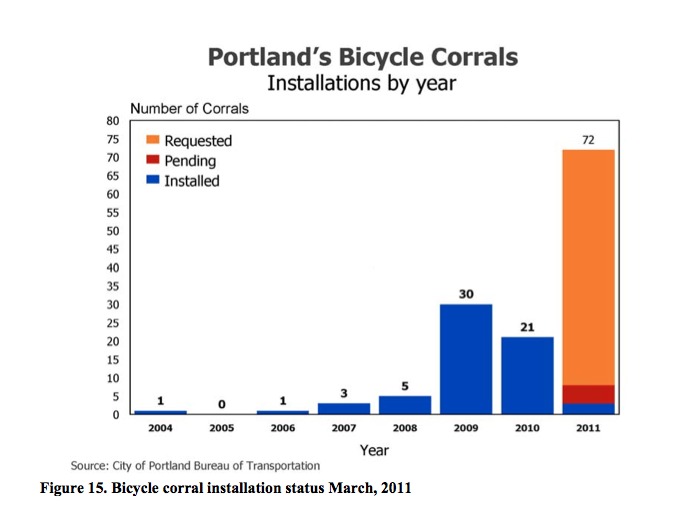
Opponents of transportation progress would have you believe there is nothing so sacrosanct as the relationship between businesses and parking spaces. While customer access is quite valuable for merchants, in many cases, car parking isn't the best way to provide it. As this story from Portland illustrates, it's time to rethink how we allocate space for street parking.
Jonathan Maus at Bike Portland reports that the city's "bike corrals" program has been a smashing success. The Portland Bureau of Transportation has an application system set up to process requests to replace car parking spaces with convenient spaces to lock up bikes, and the city literally cannot keep up with the demand from local businesses. Says Maus:
In fact, PBOT has been overwhelmed by applications for bike corrals. PBOT bike parking program manager Sarah Figliozzi has a stack of applications from 75 Portland businesses that want corrals. At the current rate of installation (30 in 2009 and 21 in 2010), Figliozzi estimates it would take two years just to work through the list.Why can't they install more of them? Figliozzi says it's not as easy as you might think because each location has different issues to deal with and PBOT approaches each one on a case-by-case basis.
"We have a groundswell of enthusiasm from the private sector... We need to be able to give businesses with the money and the interest to do them the ability to do this on their own... That's the direction we want to go."
From a business perspective this makes perfect sense. Bike corrals allow businesses to trade two spaces for cars for a dozen or more two-wheeled customers. As this case illustrates, happily, the more sustainable choice is often the smarter business move, as well.
Elsewhere on the Network today: Cycleicio.us reports that Frontier Airlines is offering "bikes fly free" service for its premium passengers. Rights of Way carries the news that Portland is planning to build a network of "neighborhood byways" where cyclists and pedestrians will be prioritized over motor vehicles. And Pattern Cities explains the difference between tactical and DIY urbanism.






